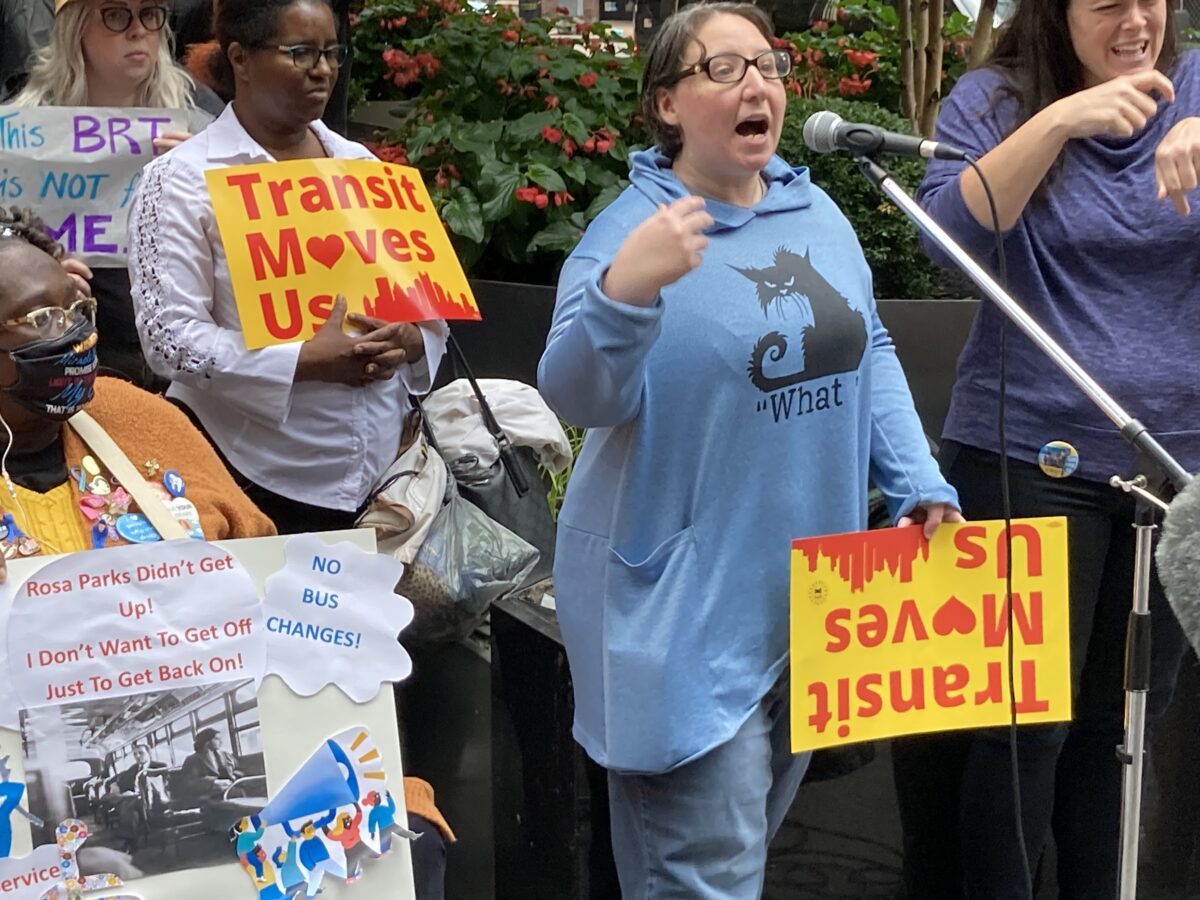Several dozen transit riders and advocates rallied outside and complained to the Pittsburgh Regional Transit board of directors Friday about route changes that will begin Sunday in Oakland.
But the agency said those changes — ending the 61D and 71A, C and D trips in Oakland instead of continuing to Downtown Pittsburgh — will go forward because they are important to keep the system operating as reliably as possible during Downtown construction.
CEO Katherine Eagan Kelleman said the start of construction Downtown three weeks ago for the $291 million Bus Rapid Transit system to Oakland will make the crowded business district even more difficult for buses to navigate and stay close to their schedule for the next two years. That’s why the agency jumped at the chance to make the already approved changes for those routes now to reduce Downtown congestion that affects routes throughout the system, not just routes to the east, she said.
“A blip on those routes is a blip on the whole system,” she said. “We had an opportunity to avoid that.”
Continuing those routes into Downtown “would put them in the same bucket of unreliability” as other routes dealing with construction, she said.
The critics claim that ending those routes at Robinson Street will force riders to transfer if they want to continue Downtown, which would cost customers paying cash two full fares of $2.75. Several riders who use wheelchairs said transfers are particularly difficult for them, extending their trip time and moving them to vehicles that are already crowded and may not have enough space for them.
Verna Johnson of East Liberty, who uses a wheelchair, said she currently can get where she needs to go for groceries using one bus. With the changes, she will need to transfer twice, she said before the rally.
“They are not efficient now,” she said. “What would make me think the BRT will make it better?”
The group held signs outside denouncing the changes and chanted phrases such as “Bus line, life line” and “More access, not less.”
Ross Nicotero, union president and business agent for 2,200 operators, maintenance, workers and office personnel, said it is “wrong on many facets” for the agency to make the changes two years before BRT service begins. Although the changes are part of the union’s three-times-a-year pick of new route assignments, he said the union would be willing to forgo that process to postpone Sunday’s changes if the agency decided not to go through with them at the last minute. Operators would continue to work under their June schedules until new picks could be made without the Oakland changes in about six weeks, he said.
“We have to do better for the people of Allegheny County,” he said.
Laura Wiens, president of Pittsburgers for Public Transit, questioned why the agency would consider cutting service in the same area where it is building a new system.
“This is potentially their most important transit corridor,” she said. “Why would you cut service there?”
Controversy about changes for the BRT date back more than five years to before Kelleman’s appointment at the agency. The original plans called for almost all East End and suburban buses to end their routes in Oakland, with all passengers required to transfer if they were heading Downtown.
After a strong outpouring from residents in those neighborhoods, the agency adjusted the project to allow most of those buses to use the exclusive lanes that will be established for the project. That included ending the four routes in Oakland.
The agency claims that 97.7% of riders will have Downtown service at their same stop without transferring and 99% will have no-transfer service within a five-minute walk.
Kelleman said the recent complaints are a very small percentage of the 12,300 riders who use those routes and most of the claims deal with the inconvenience they will cause. That’s different from the concerns five years ago, when people said they would be unable to get to work, medical services and food if suburban service was reduced or ended in Oakland.
“I understand change is difficult, and no change is going to make everyone happy,” she said. “But you can still get there.”
The agency will monitor how the new service is working and will make additional adjustments, if necessary, she said.
Ed covers transportation at the Pittsburgh Post-Gazette, but he's currently on strike. Email him at eblazina@unionprogress.com.



